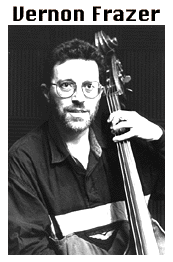






 |
 |
 |
 |
 |
 |
 |
| |||

 In DEMON DANCE, his second collection of poetry, Vernon Frazer writes as a combination of social critic and exorcist. First diagnosed with Tourette syndrome when he was 48, Frazer has nevertheless lived with the stigma of being considered "different," sometimes even "crazy" as a consequence of this disorder. "The Sane," which opens this powerful collection of poetry, returns in kind the condescension directed toward those whom the "normal" deem "different." The images Frazer uses to describe his narrator's "madness" include such Tourettic symptoms as skin-biting and verbal attacks. As he continues his survivor's journal, Frazer encounters relics of early rock 'n roll, faceless bureaucrats eager to spawn their reflections, politicians making empty promises, and a succession of lovers. None of them escapes commentary as he sheds his past to embrace the passion of the moment. "Demon Dance," the apocalyptic title piece, is both a celebration of the spiritual sandblasting performed by the great tenor saxophonist John Coltrane and his protegee Pharaoh Sanders, and a celebration of Frazer's triumph over Hodgkins Disease, a form of Cancer that threatened his life in his early to late twenties. Although schooled in the work of Ezra Pound and William Carlos Williams, Frazer's work takes their modification of the poetic line a step further as he splashes phrases across the page in patterns that generate tension and rest for the reader's eye and ear while creating a spinning intensity most accurately described as Tourettic.
DEMON DANCE Vernon Frazer is a fighter, a no-frills body slammer who throws his punches straight on and aims for the most vulnerable organ, the heart. You can keep your eyes on his hands -- full of bleeding, Byzantine verse -- but when he locks eyes with you, you turn away at your peril. Humanity is spoken here. DEMON DANCE is an exhausting but exhilarating volume of poems. Following the searing, confessional style of Burroughs, Bukowski, Ginsberg, Algren, Kerouac and Celine, Frazer absorbs his influences and vaults beyond them, into his consciousness, like a person who has outlived a deadly disease and has nothing to lose. Frazer has in fact survived such insults, both physical and mental, and has turned his experience into art, eschewing the safe, tidy miniatures of the salon for poetic forms that strain to rearrange the foundations of language as a tool for naming the unnamable. From fern bars and stifling offices to pretentious poetry readings and nightmarish journeys down the via negativa, the poems in DEMON DANCE move, like restless spirits, from one alienated scene to another until an epiphany is reached by bending the words to the task, which, as always, is survival. In the title poem, an epic struggle between the forces of light and darkness, the poet becomes both Dante and Virgil and finds his way from hell to life. Vernon Frazer is a poet who takes no prisoners. Read DEMON DANCE and be amazed.
--- Steve Starger | |||
|
| SITE MAP | MISSION STATEMENT | | |||
TOURETTE SYNDROME'S TABLE OF CONTENTS |